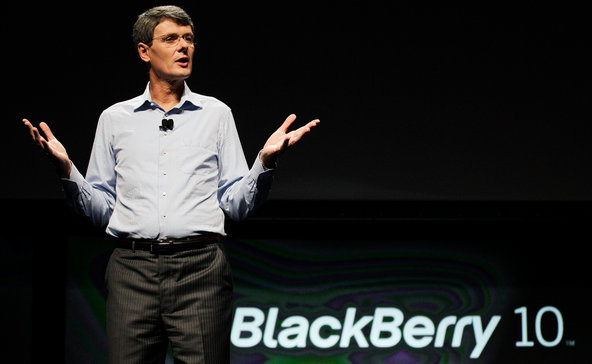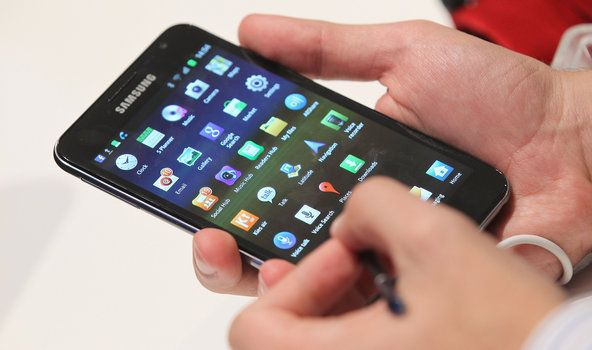In an event on Wednesday in New York to unveil a line of new smartphones and new software to operate them, Thorsten Heins, the company’s chief executive, synchronized the names as BlackBerry. But because the new name is now tied to the company’s hopes of restoring its main product’s status as a symbol of executive cool, the change carries some risk.
Frank Boulben, chief marketing officer of BlackBerry, said that Research in Motion had become more confusing than inspired. “We thought this was time to symbolize a real change with a name change,” Mr. Boulben said. “We wanted to have one brand, one premise, to focus all of our marketing efforts.”
Those efforts will reach new heights on Sunday, when BlackBerry will run an ad during the Super Bowl promoting the BlackBerry Z10, a touch-screen phone, and the BlackBerry Q10, a phone that combines a traditional BlackBerry physical keyboard with a smaller touch screen.
The new name was the biggest surprise in Mr. Heins’s presentation. The company began demonstrating the touch-screen phone and operating system in May and also made prototypes available to app developers at that time.
But Mr. Heins kept the focus on the phones. “Today represents a new day in the history of BlackBerry,” he said. “These BlackBerry 10 devices are absolutely the best typing experiences in the industry.”
Analysts, technology reviewers and app developers with advance access to the BlackBerry Z10 and the BlackBerry 10 operating system liked the phone, calling it the company’s first competitive touch-screen phone.
But the new products arrive long after Apple’s iPhone and phones using Google’s Android operating system have come to dominate the smartphone market, so their success is anything but assured. According to IDC, BlackBerry now holds just 4.6 percent of that market, about one-tenth of its peak market share.
Analysts are concerned about how long it will take for the phones to go on sale in the United States. BlackBerry said the Z10 would be available in Canada on Feb. 5 and in the United States in March. Verizon Wireless announced that it would sell the Z10 for $200 with a two-year contract. BlackBerry 10 phones will also be carried by ATT, Sprint and T-Mobile, but those companies said they would announce prices later.
Mr. Heins, who took over as chief executive a year ago, said the company would release the second keyboard model, the Q10, in April. “I think the longer the time between announcement and availability these days, the worse it is,” said Jan Dawson, an analyst with Ovum. “It’s especially sad that it’ll likely be a month from that big Super Bowl spend to when it launches.”
Physically, the Z10 resembles an iPhone 5 with its corners snipped off. Unlike its competitors, the Z10 lacks a button to take users back to a home page and relies entirely on users swiping their fingers across the 4.2-inch screen from different directions to summon features or menus.
While the Z10 lacks a physical keyboard, the main attraction of BlackBerrys for many current users, the company said it had developed software that should alleviate some of the inadequacies of on-screen typing. For instance, it will offer word suggestions that can be selected with a flick of a finger.
BlackBerry said Wednesday that more than 70,000 BlackBerry 10 apps are now available.
BlackBerry 10 server software will allow corporate and government users to divide employees’ BlackBerry 10 phones into separate work and personal spheres and to give I.T. managers complete control over the former.
The company’s former name came to co-founder Mike Lazaridis in 1984 while he was watching a television program about football players using ballet lessons to improve their speed. He saw the words “poetry in motion” on the TV screen and, according to Rod McQueen, author of “BlackBerry: The Inside Story of Research in Motion,” Mr. Lazaridis said, “I knew what to do.”
BlackBerry joins a long list of companies that have changed their names to reflect a new beginning. Some of the changes, such as Apple’s decision to drop “Computer” from its name in 2007, have been subtle. Apple made that move to reflect its expansion into hand-held devices.
Other changes have been more dramatic. In 2003 Philip Morris, the cigarette and food giant, became the Altria Group to distance itself from the negative aura surrounding smoking. Interstate Bakeries adopted the name of its main cupcake product, Hostess Brands.
In 1998, Research in Motion sought professional advice and hired Lexicon Branding — which created Pentium for Intel and PowerBook for Apple — to create the BlackBerry name.
BlackBerry’s old name isn’t the only thing disappearing. Nick Manning, a spokesman for the company, said that BrickBreaker, a BlackBerry game with a cult following on Wall Street, would not be included on the new phones.
William Alden contributed reporting.
This article has been revised to reflect the following correction:
Correction: January 30, 2013
Because of an editing error, an earlier version of this article referred imprecisely to the plans of major American carriers to offer the two new BlackBerry models. While Verizon Wireless, ATT, Sprint and T-Mobile will all carry new BlackBerrys, not all will offer the Z10; Sprint has so far announced plans only to offer the other model, the Q10.
Article source: http://www.nytimes.com/2013/01/31/technology/blackberry-maker-unveils-its-new-line.html?partner=rss&emc=rss

